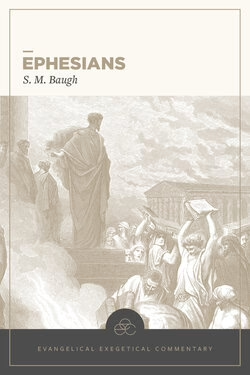
S. M. Baugh
Reviewed by: Danny Olinger
Ephesians, Evangelical Exegetical Commentary Series, by S. M. Baugh. Lexham, 2016. Hardcover, 672 pages, $45.99 (Amazon). Reviewed by New Horizons editor and OP minister Danny Olinger.
At New Horizons we attempt to review publications within a year or two of publication, but there are times when we miss reviewing books that we should have reviewed, particularly from Orthodox Presbyterian authors. S. M. Baugh’s Ephesians, dedicated to his fathers and brothers in the Presbytery of Southern California, is one such book.
Baugh states his purpose in writing is to apply his particular areas of study—ancient history, biblical theology, and Greek grammar—to the interpretative task of Ephesians. Regarding antiquity, Baugh defends the Pauline authorship of Ephesians by exposing the fallacy that Ephesians was the work of a forger who was a student of Paul. With biblical-theological exegesis, Baugh shows convincingly that the main theme of Ephesians is unity in the inaugurated new creation. Particularly, Paul puts forth in the epistle the sovereignty of the ascended Christ over the old powers that previously kept the Ephesians captive in pagan belief.
It is the third element, Baugh’s handling of the Greek text, that separates this work from other commentaries. His parsing and explanations are an education in every chapter and verse. For example, in Ephesians 6:10–29, Baugh first lists the verbs from the passage with their English translation, then the subordinate clauses from the passage that explain purpose and result, then the suggested division of the text into cola (poetic lines or stichs). From this foundation, he explains the crescendo effect in Ephesians 6:12 where each phrase starting with the preposition pros (against) increases by exactly six syllables, “For we do not wrestle against flesh and blood, but against the rulers (Greek, six syllables), against the cosmic powers over the present darkness (Greek, twelve syllables), against the spiritual forces of evil in the heavenly places” (Greek, eighteen syllables). The danger of this wrestling match facing Christians, says Baugh, is exacerbated by this enumeration of unseen forces that formerly held the Ephesians in thrall to sin and death (Eph. 2:1–3). The text itself, however, shows that the victory of Christ was a decisive victory, that he rules in the midst of his enemies. Baugh writes, “All previous uses of pneumatikos [spiritual] and epouranios [heavenly places] in Ephesians relate to the Holy Spirit and to the exalted heavens, to where Christ (and his people) ascended and from where Christ dispenses the fruits of his victory on the cross” (546). The use of these terms by Paul is ironic. The world powers of darkness might have some hold in this present evil age, but the kingdom of Christ and of God (Eph. 5:5) has been inaugurated. It only waits consummation at the end of this age (Eph. 1:21). Baugh concludes, “Until then, those who put their faith in Christ experience true and lasting peace (Eph. 2:14–16; 4:3; 6:15)—and war” (546).
Theologically rich and exegetically stimulating, Baugh’s Ephesians deserves a wider audience.
April 27, 2025
The Devoted Mind: Seeking God’s Face in a World of Distraction
April 20, 2025
April 13, 2025
Suffering: God’s Purpose in Our Pain
April 06, 2025
Sunday Matters: 52 Devotionals to Prepare Your Heart for Church
March 30, 2025
On the Trail with a Missionary
March 23, 2025
Midnight Mercies: Walking with God Through Depression in Motherhood
March 16, 2025
© 2025 The Orthodox Presbyterian Church